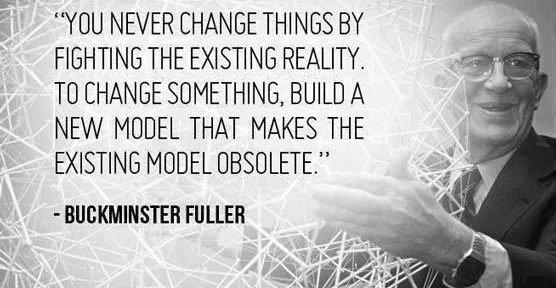 Wouldn’t it be nice to minimize the level of government coercion in your own life right now, without having to wait for the whole country to wake up?
Wouldn’t it be nice to minimize the level of government coercion in your own life right now, without having to wait for the whole country to wake up?
We have lots of interesting theoretical discussions about how we could better organize our society if we could just get rid of, or at least minimize, government, but no one seems to have a working plan to deal with that 800 pound gorilla blocking our path to a better society.
Maybe we’ve just been going down the wrong path.
Instead of spending all of our time and energy fighting the gorilla, perhaps we should simply follow a different path…
Earlier, I announced The Start Of A Truly Human Society and explained How We Can Have A Voluntary Society And The State.
In short, a voluntary society does not want to govern, so it is not competing for the right to govern. It considers those who govern to be ‘a criminal gang writ large’. The presence of a large, well-armed criminal gang is unfortunate, but does not preclude non-coercive people from conducting their affairs in voluntary ways, in every way possible.
Some of the big goals I have for our concurrent, voluntary, Truly Human Society are:
- To enable individual voluntaryists to gain the benefits of a community of like-minded people and organizations.
- To expand the range of voluntary options available to those who prefer to avoid coercively funded or operated organizations.
- To allow us to demonstrate that voluntaryism is not utopian.
- To instantiate voluntaryist structures and mechanisms ahead of time so as not to be caught unprepared in case any fortuitous changes lead to a period of anarchy or minarchy.
So here’s the plan…
The path to our voluntary Truly Human Society is actually simplified in some ways by the fact that the State is still present. Because we are not talking about ending the State as part of our plan, it means that we do not have to include in the plan such things as how to manage the transition of everyone who is currently dependent on the State.
This concurrent approach also simplifies our task in that we are not trying to satisfy everyone. Our Truly Human Society, being voluntary, will be comprised of only those who want to participate. We can implement just those things that we voluntaryists are interested in implementing.
In the plan itself, there is a primary piece and an optional piece. (The optional piece is actually aimed at the gorilla, because I can’t resist the urge to give him a poke.)
The primary part of the plan is aimed at reducing our day-to-day exposure to coercion.
Everything involved with government and its cronies entails coercion.
Government uses coercion to give itself monopolies in many areas, such as postal service, police, etc. And, government uses coercive regulations to support cartels for cronies in almost every area where big business has an interest.
Beyond the open coercion of enforcing monopolies for its ‘services’, there is also the method in which those services are funded. Voluntaryists well understand that government can’t offer them anything that wasn’t originally taken via coercion from someone else. Usage of government services, then, involves us in the coercion of others.
So, the primary part of the plan is to find ways to shun the monopolies and cartels that government attempts to force us to patronize.
Alternatives may be hard to find, in many cases, thanks to the successful efforts of the criminal gang. But we can all look – and share with each other what we do find.
Sometimes alternatives are not hard to find, just expensive relative to the coercively funded monopolies and cartels. (Private schools, for instance.) But if we purposefully direct more business to these alternatives it will encourage more start-ups and help bring down prices through greater competition.
Even where the alternatives do come at a relatively higher cost, that may still be acceptable, given the added value to you and I of thwarting the monopoly.
For instance, I used to go to a shooting range at a state park, which charged just $3 per hour. It was a very nice facility, and clearly the $3 from users was not fully funding it. Now that a private range has opened near me, I quite willingly give them my business at $18 per hour.
One potential bonus effect of enough of us shunning the monopolies and directing all of our business to their competitors can be seen in the looming bankruptcy of the US Post Office. Maybe that will become a template.
It seems that most people think poorly of politicians and government bureaucracies. But they also hold to the belief that government, even though composed of only politicians and bureaucrats, somehow provides valuable, necessary, even critical, services.
When people complain to us about government, we say “So why don’t we just get rid of it?”. But they then simply fall back on their list of important things “only government” can do.
So, for the second (optional) piece of our plan, I envision us identifying and supporting, or even creating, private equivalents to government services, so that every time the doubter says “only government can do X” we can point to an existing private alternative.
And, the private alternatives will no doubt provide better, more useful, services.
Take consumer protection, for instance, which lots of people see as a critical function that justifies the existence of government. Do you remember when all electrical devices (in the US) used to have the little round UL tag on the cord? UL was (is) a private company that rigorously tested new products for safety, and awarded them its seal if they met the appropriate standards.
UL was basically incorruptible. They knew that if they ever gave undeserved certifications and lost their reputation, they were finished. Same thing with Consumer Reports.
Contrast that with government ‘watchdog’ agencies that have well-deserved reputations for being bought and paid for, or ‘captured’, by the big crony industries they are supposed to be protecting us from.
All we seem to get from the government consumer protection agencies are lots of ugly, moronic warning labels all over products, and then when products are proven, by others, to be unsafe, they simply blame their ‘limited’ budget and go right back to work protecting their crony bosses.
If you think back to the recent controversies over Bovine Growth Hormone (rbGH) in milk and BPA in plastic bottles, the FDA fought tooth and nail to support the use of both of them until private organizations like EWG were able to bring enough public visibility and outrage to force the industry to ‘voluntarily’ abandon them. As far as I can tell, the FDA continues to support the use of both chemicals.
So the second piece of the plan is about continually undermining the path the gorilla sits on.
But remember, the primary reason to start our own Truly Human Society is to rid our lives of as much coercion as possible right now by working together as a community to find and support all of the private alternatives that will enable us to shun coercive government monopolies and crony cartels.
I will be blogging my ideas for our Truly Human Society on this site, and will be re-blogging pertinent posts from other sites here as well. Please add your ideas and suggestions in the comments.
Let’s get it started!
Like this:
Like Loading...
 Last summer’s calls by libertarian activist Adam Kokesh for armed marches on Washington and on the fifty State Capitals elicited multiple responses from Shawn Gregory on his WeebulTree Blog.
Last summer’s calls by libertarian activist Adam Kokesh for armed marches on Washington and on the fifty State Capitals elicited multiple responses from Shawn Gregory on his WeebulTree Blog.




